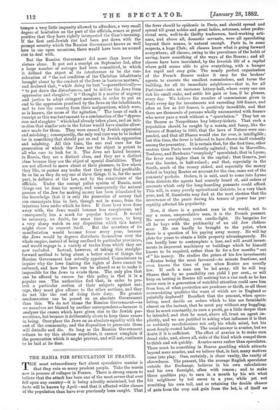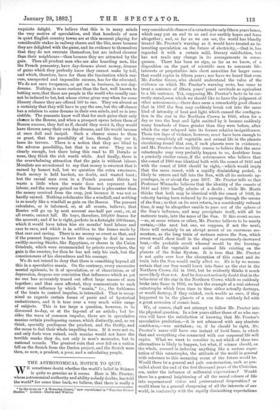THE MANIA FOR SPECULATION IN FRANCE.
THE most extraordinary fact about speculative manias is that they ruin so many prudent people. Take the mania now in process of collapse in France. There is strong reason to believe that the attack has been one of the most severe that ever fell upon any country—it is being adroitly minimised, but the facts will be known by April—and that it affected wider classes of the population than have ever previously been caught. That
the fever should be epidemic in Paris, and should spread and spread till great nobles and great ladies, actresses, sober profes- sional men, well-to-do thrifty tradesmen, hard-working arti- sans, and above all, domestic servants, were all speculating beyond their means, is natural enough. Paris is, in some respects, a huge Club; all classes know what is going forward everywhere; all classes, owing to the prevalence of the habit of saving, know something of the ways of the Bourse ; and all classes have been inoculated, by the feverish Ma of a capital where gold seems able to give everything, with a hunger for rapid and easy gain. The nearly perfect organisation of the French Bourse makes it easy for the brokers' agents to execute the smallest commissions, and turns the building, for all its immediate neighbours—that is, for all Parisians—into an immense lottery-hall, where every one can risk his small stake, and settle his gain or loss, if he pleases, every day. We believe the number of commissions given in Paris every day for investments not exceeding 500 francs, and often as low as 100 francs, is positively incredible, and that there are thousands of persons wholly unconnected with finance who never pass a week without a "speculation." They bet on the Bourse as Neapolitans buy lottery-tickets. That such a population should be caught by a mania, and fancy, like the Parsees of Bombay in 1863, that the laws of Nature were sus- pended, and that all Shares would rise for ever, is intelligible ; but this time, the fever is believed to have shown itself violently among the peasantry. It is certain that, for the first time, other centres than Paris were violently agitated ; that in Marseilles, Toulouse, and Bordeaux "everybody" speculated; that in Lyons, the fever rose higher than in the capital ; that Geneva, just over the border, is half-ruined; and that, especially in the South, much of the money risked, and especially the money risked in buying Rentes on account for the rise, came out of the peasants' pockets. Orders, it is said, used to come into Lyons from districts the agents had scarcely heard of, and orders of amounts which only the long-hoarding peasants could afford. This will, in many purely agricultural districts, be a very black year, and M. Gambetta may find at the next election that the occurrence of the panic during his tenure of power has per- ceptibly affected his popularity.
Now, if there is a prudent man in the world, not to say a mean, unspeculative man, it is the French peasant. He saves everything, even candle-light. He bargains for all he buys with the pertinacity of an old Jew clothes- man. He can hardly be brought to the point, when there is a question of his paying away money. He will lay plots for years to obtain a little property advantageously. He can hardly bear to contemplate a loss, and will avoid invest- ments in improved machinery or buildings which he himself knows to be required, rather than lie for a few months "out of" his money. He studies the prices of his few investments —Rentes being the most favoured—to minute fractions, and even knows the time of year when Rentes are usually low. If such a man can be led away, till he will buy Shares that by no possibility can yield 1 per cent., or will keep on betting in Rentes till nothing but a rise such as he has never seen in a generation of watchful attention could save him from loss, of what protection are prudence or thrift, or all those accumulating qualities the want of which are in England so painfully deplored? Recollect that the peasant, when specu- lating, must decide on orders which to him are formidable almost on the instant, that he must pay without any haggling, that he must constantly, to earn a profit, go a little deeper than he intended, and that he must, above all, trust an agent im- plicitly, and we are justified in asking what influence it is that so suddenly revolutionises not only his whole mind, but his most deeply-rooted habits. The usual answer is avarice, but we doubt if it is sufficient. The effect of avarice is to make men dread risks, and, above all, risks of the kind which compel them to think and act quickly. Avarice saves rather than speculates. There must be something in Bourse gambling which attracts beyond mere avarice, and we believe that, in fact, many motives come into play. One, certainly, is sheer vanity, the vanity of shrewdness. The peasant, like the average English speculator outside the Exchange, believes in his own calculations and his own foresight, often with reason; and to make those qualities pay, to earn in a month by his wit what his neighbour by toil earns in a year, while yet not remitting his own toil, and so retaining the double chance of gain from the crop and gain from the bet, is of itself an
exquisite delight. We believe that this is in many minds the very motive of speculation, and that hundreds of men in quiet English country towns are at this moment playing for considerable stakes in railway shares and the like, more because they are delighted with the game, and its evidence to themselves that they do not overrate themselves, but are indeed cleverer than their neighbours—than because they are attracted by the gain. Then all prudent men who are also hoarding men, like the French peasantry, have day-dreams about money, dreams of gains which they perfectly know they cannot make by toil, and which, therefore, have for them the fascination which suc- cess, unexpected and impossible success, has for the educated. We do not save twopences, or get on in business, in our day- dreams. Nothing is more curious than the fact, well known to betting men, that there are people in the world who usually can- not be induced to bet, but whose virtue gives way when for some illusory chance they are offered 500 to one. They see almost as a certainty that they will have to pay the one, but the off-chance has a relation to some dreams in their own minds, and so is irre- sistible. The peasants know well that for such gains their only chance is the Bourse, and, when a prospect opens before them of Bourse success, they feel as if, should they resist it, they would have thrown away their own day-dreams, and life would become at once dull and insipid. Such a chance seems to them so great, that the possibility of loss, though they see it, loses its terrors. There is a notion that they are blind to the adverse possibility, but that is an error. They see it clearly enough, but there being this road to El Dorado or none, they think the risk worth while. And finally, there is the overwhelming attraction that the gain is without labour. Moralists are accustomed to say that money is sweetest that is earned by honest toil, but we question the extra sweetness. Such money is held hardest, no doubt, and wasted least ; but the carnal man even in a French peasant thirsts to waste a little when the waste does not represent hard labour, and the money gained on the Bourse is pleasanter than the money received from the crop, just because it was not so hardly earned. Nothing exhilarates like a windfall, and nothing is so nearly like a windfall as gain on the Bourse. The peasant calculates, or is informed, or, at all events, believes, that Rentes will go up by next account one-half per cent., or, at all events, cannot fall. He buys, therefore, 100,000 francs for the account; and if he is right, pockets in a fortnight 500 francs, which it would have taken him six months' hard labour and care to save, and which is in addition to the francs made by that care and saving. There is no money so sweet as that, and if the peasant happens to have the courage to deal in more swiftly-moving Stocks, like Egyptians, or shares in the Union G6ne'rale, which were recommended by priests everywhere, the gain is the sweeter, for then he has not only his cash, but the consciousness of his shrewdness and his courage.
We do not intend to deny that there is something beyond all this in a speculative mania. On the contrary, every successive mental epidemic, be it of speculation, or of chauvinism, or of depression, deepens our conviction that influences which as yet no one has accurately traced out affect large masses of men together; and that once affected, they communicate to each other some influence by which "mania," i.e., the feebleness of the brain to control impulse, is intensified.. That is recog- nised as regards certain forms of panic and of hysterical imitativeness, and it is true over a very much wider range of subjects. This is too large a question, however, to be discussed to-day, or at the fag-end of an article ; but be- sides the wave of common impulse, there are in speculative manias certain predisposing causes, which distinctly, and, as we think, specially predispose the prudent, and the thrifty, and the mean to feel their whole impelling force. If it were not so, and only fools were ruined, such manias would not leave the terrible marks they do, not only in men's memories, but in national records. The greatest ruin that ever fell on a nation fell on the Scotch from the Darien project, and the Scotch were then, as now, a prudent, a poor, and a calculating people.







































 Previous page
Previous page